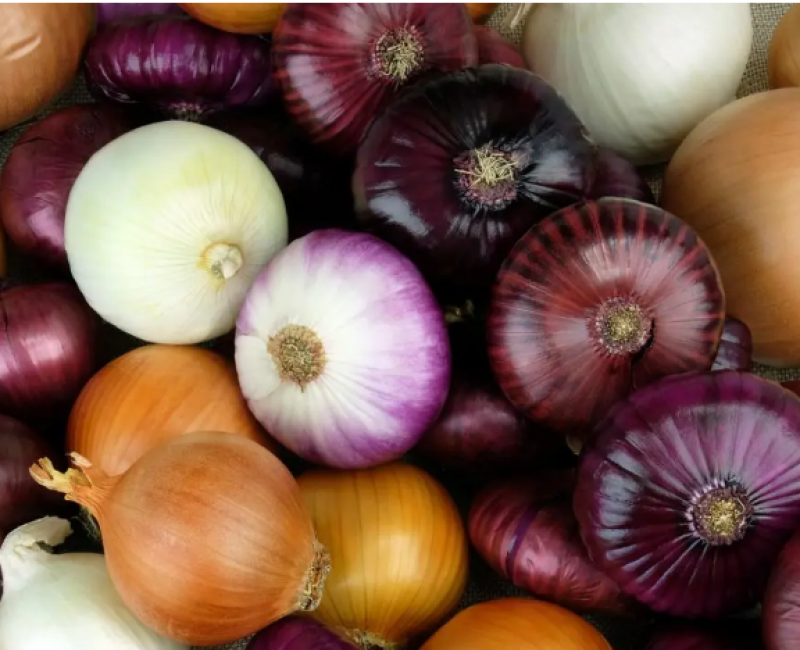Onions belong to the Allium family of plants, which also includes chives, garlic, and leeks. These vegetables have characteristic pungent flavors and some medicinal properties.
Onions vary in size, shape, color, and flavor. The most common types are red, yellow, and white onions. The taste of these vegetables can range from sweet and juicy to sharp, spicy, and pungent, often depending on the season in which people grow and consume them.
Farmers have cultivated allium vegetables for centuries. According to the Food and Agriculture Organization of the United Nations, China is the biggest producer of onions worldwide.
It is common knowledge that chopping onions causes watery eyes. However, onions may also provide potential health benefits. These may include reducing the risk of several types of cancer, improving mood, and maintaining skin and hair health.
In this article, we discuss the possible benefits of onions, their nutritional content, and how to include more of them in the diet.
Onions might have positive effects on several different aspects of health.
Cancer prevention
The antioxidants in onions may help counter free radical compounds.
Researchers have examined allium vegetables extensively in relation to cancer, especially stomach and colorectal cancers.
A 2019 study in the Asia Pacific Journal of Clinical Oncology compared 833 people with colorectal cancer with 833 people who did not have the disease.
The researchers found that the risk of colorectal cancer was 79% lower in those who regularly consumed allium vegetables, such as onions.
Experts do not fully understand the exact mechanism by which some compounds in onions inhibit cancer. Some hypothesize that onions inhibit tumor growth and cell mutation.
One cup of chopped onions also provides at least 13.11%Trusted Source of an adult’s recommended daily intake of vitamin C. As an antioxidantTrusted Source, this vitamin helps counter the formation of free radical compounds that have links to cancer.
One review from 2015 Trusted Source found a general relationship between an increased consumption of allium vegetables and a reduced risk of cancer, especially cancers of the stomach and gastrointestinal tract.
The authors note that there are compounds called organosulfurs in onions, some of which suppressed aspects of tumor growth. However, they conclude that not all organosulfurs have antioxidant properties.
Further research is necessary to confirm which compounds in onion have protective effects against cancer.
The review also highlighted gaps in the research to date. The authors suggested that onions and other allium vegetables do not prevent cancer in isolation but work in tandem with other lifestyle factors to reduce the risk.
They also advised that while research has revealed some associations between allium vegetable consumption and reduced cancer risk, the amount that a person needs to consume to get the maximum benefit is not yet clear.
Skin and hair
As a good source of vitamin C, onions may support the building and maintenance of collagen.
- Collagen provides structure to skin and hair.
- Blood pressure moderation
A 2019 reviewTrusted Source found that quercetin, a compound in onion skin, had links to lower blood pressure when the researchers extracted it and administered it as a supplement.
However, the study did not examine the potential effects on blood pressure of eating onion as part of the diet rather than taking quercetin in supplement form.
Nutrition
Onions are a nutrient-dense food, meaning that they are high in vitamins, minerals, and antioxidants while being low in calories.
One cup of chopped onion providesTrusted Source:
- 64 calories
- 14.9 grams (g) of carbohydrate
- 0.16 g of fat
- 0 g of cholesterol
- 2.72 g of fiber
- 6.78 g of sugar
- 1.76 g of protein
Onions are a good source of the following nutrientsTrusted Source, according to the recommended daily allowance (RDA) and adequate intake (AI) values from the Dietary Guidelines for AmericansTrusted Source:
Nutrient Percentage of daily requirement in adults
- Vitamin C (RDA) 13.11% for males and 15.73% for females
- Vitamin B-6 (RDA) 11.29–14.77%, depending on age
- Manganese (AI) 8.96% for males and 11.44% for females
Onions also contain small amounts of:
- calcium
- iron
- folate
- magnesium
- phosphorus
- potassium
- the antioxidants quercetin and sulfur
Risks
Onions pose few risks to the people who eat them.
However, some people may have an allergy or intolerance to onions. Anyone who experiences a reaction after eating them should be sure to seek medical attention.
Why does chopping onions cause tears?
Onions have a reputation for making people cry during the cutting or chopping process. This response occurs due to the presence of a gasTrusted Source called syn-Propanethial-S-oxide.
This chemical is a compound liquid that acts as a lachrymatory agent, meaning that it causes tears or stings the eyes.
To reduce tears during chopping, the National Onion Association recommend chilling an onion for 30 minutes then cutting off its top. The person should then peel the outer layer of the onion and leave the root intact, as this part has the highest concentration of lachrymatory agents.
Despite the tears that they can produce, onions can be a healthful addition to any eating plan. However, a person’s overall eating pattern is most important in disease prevention and good health.


































































































